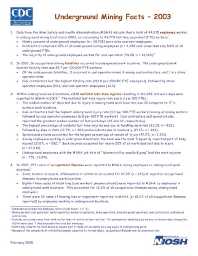Mining Publication: Underground Mining Facts - 2003
Original creation date: February 2005
Data from the Mine Safety and Health Administration (MSHA) indicate that a total of 44,015 employees worked in underground mining locations in 2003, corresponding to 44,778 full-time equivalent (FTE) workers. In 2003, 16 occupational mining fatalities occurred in underground work locations. The underground work location fatality rate was 35.7 per 100,000 FTE workers. Within underground work locations, 2,818 nonfatal lost-time injuries resulting in 193,983 lost work days were reported to MSHA in 2003. The nonfatal lost-time injury rate was 6.3 per 100 FTEs. In 2003, 257 cases of occupational illnesses were reported to MSHA among employees in underground work locations.
Authors: National Institute for Occupational Safety and Health
Brochure/flyer - February 2005
NIOSHTIC2 Number: 20025913
U.S. Department of Health and Human Services, Public Health Service, Centers for Disease Control and Prevention, National Institute for Occupational Safety and Health, DHHS (NIOSH) Publication No. 2005-117, 2005 Feb; :1
See Also
- Coal Operator Mining Facts - 2005
- Metal Operator Mining Facts - 2002
- Metal Operator Mining Facts - 2004
- Metal Operator Mining Facts - 2005
- Noncoal Contractor Mining Facts - 2003
- Nonmetal Operator Mining Facts - 2002
- Nonmetal Operator Mining Facts - 2008
- Sand and Gravel Operator Mining Facts - 2006
- Stone Operator Mining Facts - 2003
- Stone Operator Mining Facts - 2005
- Page last reviewed: 9/23/2016
- Page last updated: 9/23/2016
- Content source: National Institute for Occupational Safety and Health, Mining Program


 ShareCompartir
ShareCompartir
